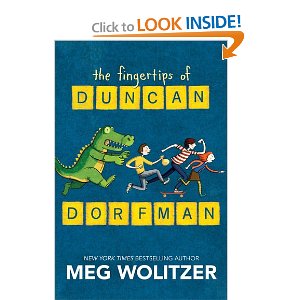I admit that I am a Scrabble tournament virgin. I've only ever seen a Scrabble tournament while watching the documentary Word Wars, and I've read about this particular subculture in Stefan Fatsis' delighful Word Freak. But in many ways the Scrabble tournament world doesn't seem to differ too much from its intellectual cousins, or "sports of the brain"-- the spelling/geography bee (if you haven't seen Spellbound, one of my favorite documentaries of all time, add it to your Netflix queue immediately!) and the chess tournament. This was one of my biggest take-aways after reading Meg Wolitzer's delightful foray into children's literature, The Fingertips of Duncan Dorfman.
 Wolitzer, best-known for literary fiction like The Ten-Year Nap and this year's popular The Uncoupling, tries her hand at children's fiction here. This novel, directed at readers aged 9-12, has elements kids will love-- like a whiff of romance and a touch of magical realism. It also contains tips for aspiring Scrabble players including a list of two-letter words, "vowel dump" words, etc. The main characters embody particular archetypes of competitive childhoods (the father who lost this Scrabble tournament as a kid and now wants his son to win, the girl who doesn't fit into her jock family, the homeschooled boy) while also capturing the sense of camaraderie that often develops between kid competitors.
Wolitzer, best-known for literary fiction like The Ten-Year Nap and this year's popular The Uncoupling, tries her hand at children's fiction here. This novel, directed at readers aged 9-12, has elements kids will love-- like a whiff of romance and a touch of magical realism. It also contains tips for aspiring Scrabble players including a list of two-letter words, "vowel dump" words, etc. The main characters embody particular archetypes of competitive childhoods (the father who lost this Scrabble tournament as a kid and now wants his son to win, the girl who doesn't fit into her jock family, the homeschooled boy) while also capturing the sense of camaraderie that often develops between kid competitors.
As I said I have never attended a Scrabble tournament, but I did attend over 15 scholastic chess tournaments while doing research for Playing to Win: Raising Children in a Competitive Culture. The biggest tournament I attended was the grade Nationals, where over 1300 kids converge each November/December. These grade national decide who the top chess player is in each grade (K-12). Wolitzer's description of the fictional Youth Scrabble Tournament (modeled on the real National School Scrabble Championship, down to the $10,000 prize) resonated with my observations at chess nationals. She writes beautifully: "Players hunched over their Scrabble boards in intense, aching silence." (159).
Surrounding this intense, aching silence are the parents, roped off from the tournament floor (true for both chess and Scrabble). As with chess, some Scrabble parents want their kids to be in the Scrabble Club thinking it might help their children get into college someday. Since I wrote about some of my original research recently, I thought I would share this quote from a lawyer mom whose fourth-grade son plays tournament chess: It’s that ability to keep your concentration focused, while there’s stuff going on around you. As you go into older age groups, where people are coming in and out, the ability to maintain that concentration, a connection with what’s going on, on the board in front of you, and still be functional in a room of people, it’s a big thing. I mean to see those large tournaments, in the convention centers, I know it is hard. I did that to take the bar exam, and the LSAT I took for law school, and GREs. You do that in a large setting, but some people are thrown by that, just by being in such a setting. Well that’s a skill, and it’s an ability to transfer that skill. It’s not just a chess skill. It’s a coping with your environment skill. Playing in large, timed events-- whether they be Scrabble, chess, or something else-- is seen as having tangible, transferable long-term benefits for kids (note that this perspective even goes beyond college to graduate/professional school achievement).
Still the kids are at the heart of The Fingertips of Duncan Dorfman just as they are at the heart of their own experiences in the real world. Kids become part of the culture of their chosen activity, picking up lingo (like "coffeehousing" in Scrabble and "skittling" in chess). They worry about the costs of competition (both financial and social), but embrace the friendships that develop in a place where they feel they fit in and belong. They also figure out how these competitive activities really work. Wolitzer explains: “With Scrabble, Duncan saw, you didn’t need to be a genius. You didn’t even have to know what the words meant, though it could be more interesting—and sometimes useful—if you knew the meanings of some of the strange ones… You mostly had to know which ones were good, and which ones weren’t.” (101)
It's true that don't have to be a genius to be the best Scrabble player, speller, or chess player in your age division. But you do need to be a genius to write like Wolitzer and have her level of insight not only about childhood, but also about parenting and relationships. For this reason, this book is worth a read by any adults with kids involved in competitive academic activities, or by any adults who themselves love Scrabble tournaments.